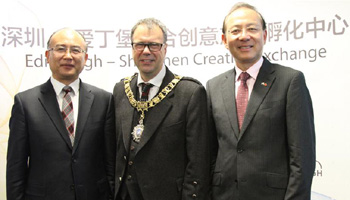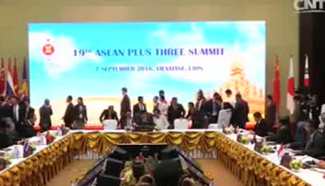by Zhou Yan, Li Keyong and Li Chunhui
GUIYANG, Sept. 8 (Xinhua) -- Like most women her age in China, Liu Fang has only one child.
But at the rural school in southwest China's Guizhou Province where she teaches, students call her "mom" and share little secrets with her they would never tell their parents or friends.
With her artistic talent and an innate love of teaching, Liu makes the classroom her stage. Her classes are like talk shows, triggering roars of laughter among her teenage audience. The fun approach to learning works -- her students often outperform their peers on exams.
"Her writing on the chalkboard was always a highlight," one former student recalled more than 10 years after graduation.
Actually, her writing was messy. She often overshot the chalkboard and scrawled on the wall. Liu Fang had completely lost her eyesight by the time she stopped teaching Chinese language classes.
Liu has never given up hope. In addition to teaching Chinese, she has also been a campus counselor, a published author, and a role model whose story has featured in newspaper articles read by millions. In a country where job opportunities for blind people can be limited, her achievements are profound.
Her novel, "Green Pomegranates," is largely auto-biographical. She has donated all the proceeds from the book to rural schools in Guizhou.
Last year, Liu was recognized as one of the 10 most inspiring individuals or groups through an awards program sponsored by Xinhuanet.com and based on a public vote.
On the eve of Chinese Teacher's Day on Sept. 10, Liu has received greetings from her former students, senior officials in Guizhou Province, as well as complete strangers who are moved by her experience.
INTO THE DARKNESS
Liu Fang was 26 when found out she was going blind.
It was in 1997. Her son was eight months old and she was in her fourth year of teaching Chinese at No. 3 Middle School in the suburbs of the provincial capital Guiyang.
She could not see properly at night, and in daylight she saw colorful ripples. Doctors said it was a rare retinal disease that would eventually lead to blindness.
The diagnosis hit Liu like a thunderbolt. She spent many nights weeping.
But when she appeared in front of her students and colleagues in the morning, she was the same cheerful woman whose laughter could be heard even before she entered a room.
To prepare for total blindness, she learned every word in the school textbooks by heart. The children often saw her holding the textbook upside down while still reading the text out loud without any mistakes.
In class, she told jokes, sang songs and mimicked the characters in the texts. "I had to make my classes lively and interesting so the children follow me, as I could not observe their reactions with my eyes," she says.
Her colleagues would read out the children's writing assignments for her before she gave comments. She always drew a cartoon on their work: a smiling face for a good job, a teary one for sorrow or sympathy, and a confused one for something incomprehensible.
Very often the eyes, noses and mouths were wonky, but she could always get the expressions right: she had taken art classes for two years before she went blind. One of her best paintings was an owl peering into the darkness, which was soon to become the view through her eyes.
Liu read her last novel with her naked eyes in 2001. In 2003, her field of vision had become so narrow that she was almost knocked down by a car. She became totally blind in 2007.
LIGHT OF HEART
Liu's husband used to work away from home, and for many years Liu and her child took care of each other. He helped her with cooking and cleaning and she told him stories. He sang and she danced to the music.
The boy, now away studying at university, began helping his mother cross the street when he was three. Throughout his school days, he escorted his mother to work before going to his own classroom.
"My mother is an extraordinary woman in many ways," he wrote in an essay. "Her eyes cannot see, but there's light in her heart."
Liu Fang appears healthy and robust. Standing 5 feet tall, she walks nimbly and talks fast. She loves dressing up and her favorite color is red. "I'm a Virgo and am meticulous with my work and my look," she says.
After she completely lost her sight, she was advised to quit her job because teaching positions, like any on the official payroll, are highly coveted in the impoverished province. "I refused to leave, because that would mean my life had to end," she explained.
The school principal let her stay and gave her a new job as a counselor.
The rural school with more than 1,300 students badly needed someone in the role, as at least a quarter of the teenagers are "left-behind" children whose parents had moved to cities in search of work. Some children stay with relatives, while others are left to take care of themselves.
Liu's new job involves giving about 100 psychological counseling classes a year and offering one-on-one counseling to those who need it.
In 2009, a girl tried to commit suicide out of despair over her parents' separation. Liu covered the girl's eyes with a scarf and spent a whole day with her.
At the end of day, she asked the girl how it was to be blind. "I've felt my way in the darkness every day for three years but still enjoy my life," said Liu. "You, with eyes to see and such a pretty face, can certainly have a much better life."
The girl cried and promised never to give up again.
Most of rural Guizhou is poor. Liu often faces students who want to drop out of school to join their parents as migrant laborers.
One, Zeng Xianglei, dropped out in the eighth grade. Liu persuaded him to at least finish middle school.
Zeng took heed, and even finished another three years of vocational training. "He had an aptitude for music and art and his writing was great," Liu recalls.
But a few more years of education did little to change Zeng's fate. After graduation, he found a job on a construction site. He died at 21 after falling through loose scaffolding.
In his bag, his parents found a letter to Liu Fang. "Every time I quit school, you came and called me back. You never scolded me -- you lit up my heart instead. I'm so happy to be able to work now, but my heart aches whenever I remember your eye disease. Please wait for me. I'll take you to the hospital when I'm rich. Remember, I'm just like your son. If there's anything I can do for you, please call me and I'll be there for you..."
The two pages were written a week before Zeng died in 2011. (more)










